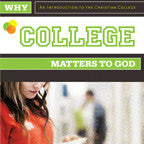Institutions affiliated with the Council for Christian Colleges and Universities (CCCU) have experienced phenomenal growth in the last twenty years. In fact, whereas public institutions of higher learning in the United States experienced a 3 percent growth in enrollment from 1990-1996, CCCU institutions witnessed a 36.9 percent growth during that same period.

Above all, Christian colleges are becoming a synthesis of intellectual thought and faith rather than a separation of the two. As explained in Dr. Rick Ostrander’s, Why College Matters to God, “A Christian College weaves a Christian worldview into the entire fabric of the institution, including academic life.”
To many incoming freshman, college itself can be incredibly intimidating with the many questions and uncertainties that lay ahead. The transition is no less severe for those that arrive at a Christian college. In order to assist students in this time of change, many Christian campuses have introduced mandatory freshman orientation classes.
Programs like the First Year Program at Abilene Christian University make every attempt to make Christ the center of their learning. As Eric Gumm, Ph.D., Director of ACU’s First Year Program, states, “We want people to be able to see… that the faculty they’ll learn from, the classes that they’ll sit in, the peers that they’ll be around and the social activities that create the foundation of the campus are ones that will challenge them and strengthen them spiritually not just academically.”
While many in the Christian community may seek out the benefits of a Christian education, some may believe that the one they gain at a Christian education is inferior to one that they may gain at a larger, secular institution. “A Christian going to a state school can certainly get a solid education, but for the other component of preparing them for their future [their faith] they are going to have to find a way to do that on their own through a local church or finding some Christian faculty members that may be at that school, as opposed to the intentionality that’s here” says Dr. Gumm.
“It’s not just about making the most of the four years, its learning how to be a Christian adult, learning how to be a responsible member of the Christian community, learning how to give of yourself, instead of just receive. I think all of those things are unique to a Christian education” states Dr. Susan Lewis, a professor of Journalism who teaches a freshman orientation course at Abilene Christian University.
Those that have lingering questions regarding the decision to attend a Christian institution will find an invaluable resource in the aforementioned Why College Matters to God (ACU Press, 2009). In the engaging book written for incoming freshman, Ostrander traces the history of the Christian College, from its beginnings in Colonial America to its current transformation in order to explain the roots of Christian education and what it is today.
What about you? Do you think an education at a Christian college is less, equally or more valuable than a secular education? Leave a comment below.





Leave a comment